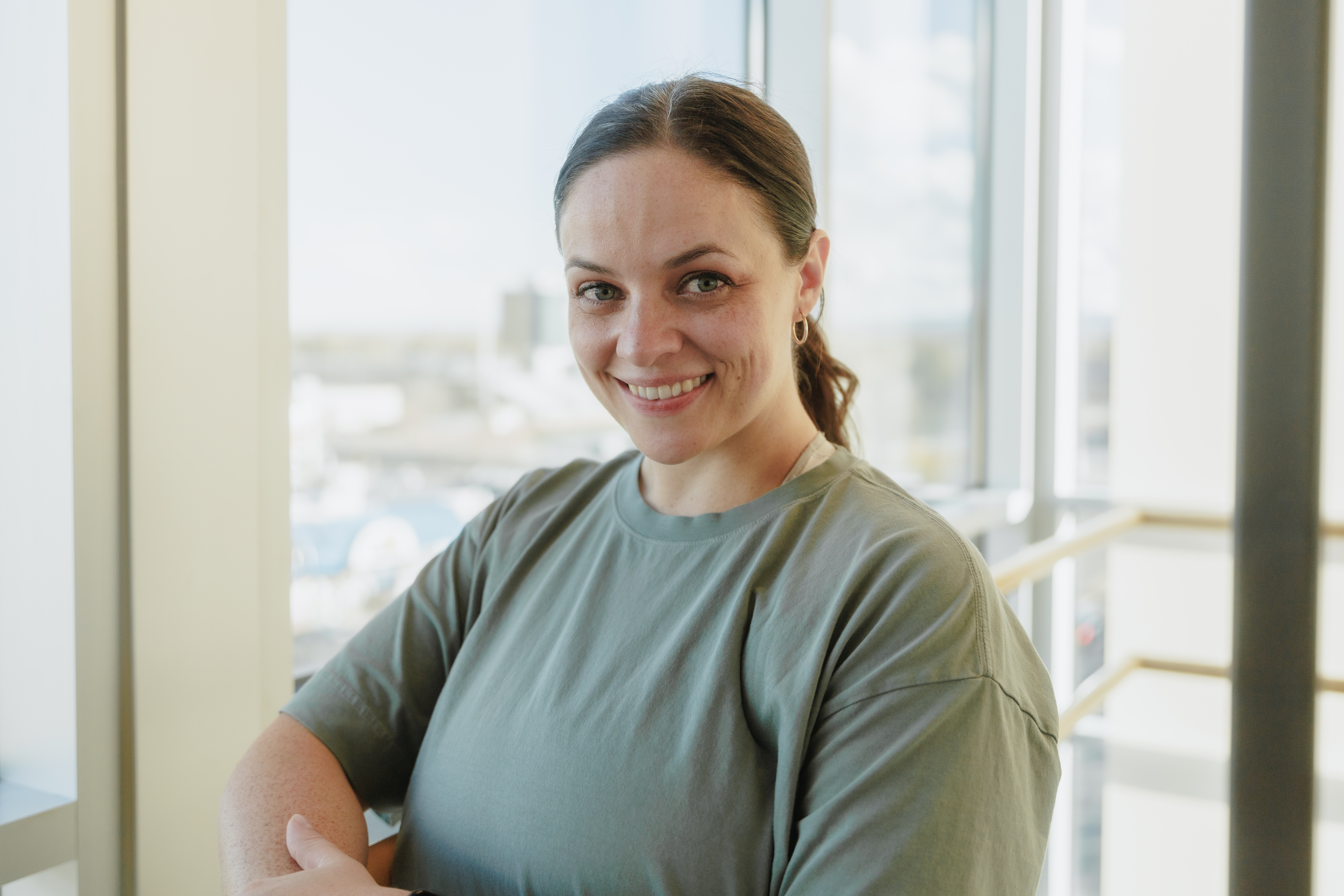Cahill diagnosed with Lynch Syndrome and cancer 5 weeks after giving birth to her son Ezekiel
“My son is our guardian angel, and my pregnancy saved my life,” said Gabbie Cahill. The CMU alumna, dance instructor and dance team coach brought her first child into the world, beat cancer and returned to teach at CMU in an even greater capacity than she ever had in the past. Her resiliency is inspiring and the Mavily is incredibly grateful to have her back.
Cahill graduated from CMU in 2013 and her significant other, Esto Paniagua, who is also a CMU alum graduated in December of 2012. The couple met briefly during high school and attended a dance together before Cahill moved to the front range with her family. “It’s funny, we have our homecoming photo framed in our home now,” Cahill said. They were reunited by chance at CMU and their relationship was instantly renewed.
The couple was ecstatic to find out that they were expecting their first child, a son who they named Ezekiel. “I taught and coached throughout my pregnancy. It was during the pandemic so we just did what we could to keep everything as normal as possible,” Cahill said. “About halfway through, things started to get rocky though.” Cahill was experiencing intense pains in the lower right quad of her abdomen, which was thought by her doctor to be round ligament pain. Cahill also became anemic and required iron infusions, another common occurrence for expectant mothers.
Ezekiel or “Zeke” made his debut, healthy as could be and the delivery was smooth. But soon after giving birth, Cahill’s abdominal pains returned, persisted and could no longer be attributed to pregnancy. A colonoscopy revealed a 6.4 x 9.2cm mass in Cahill’s cecum, which is the point where the small intestine meets the colon. It was presumed stage 3 colon cancer with lymph nodes affected. Cahill and Paniagua were crushed. “I was terrified and speechless. All I could think was, ‘no! How? I have a 5-week-old at home.’”
“I got really lucky with the people I ended up being surrounded by during all of this,” Cahill said. “My amazing OBGYN, Dr. Heather Bourkovski, called a friend she’s known since kindergarten that is a pathologist, Dr. Rachel Lacount, and a few of the nurses caring for me were also first-time moms. They all rallied around me and went to work so quickly to find out what was going on and what could be done. It was like an out of body experience. I couldn’t believe all of this was happening to me right after becoming a mother.”
“And Esto — he is my rock, our rock — and was there for me and our son every step of the way and he did it in such a loving and positive way. He’s amazing. It’s wonderful to call him my partner,” Cahill said. “When we got the next news he joked that I was the luckiest unlucky person he’s ever met.”
Cahill’s colonoscopy footage, CT images and lab work were shared between the doctors and finally she got a call from her nurse navigator, Whitney, who delivered the true diagnosis. Cahill has Lynch Syndrome, a genetic condition which makes a person 46% more likely to develop colon cancer. After reviewing the pathology, Cahill’s oncologist Dr. Sudy Jahangiri noticed that there was something different in her pathology — a protein that wasn't functioning normally. The diagnosis of Lynch Syndrome meant that Cahill could be treated with immunotherapy, which changed everything.
“They said that this type of cancer is normally undetectable until it has spread to the point that it’s too late to treat. If it weren’t for my pregnancy I might not even be here today,” Cahill said. “Zeke saved my life. I know it without a doubt.” Cahill’s diagnosis prompted her mom and sisters to get tested for Lynch syndrome and both are positive. Her son will have to wait until he is 18-21 to be tested, as the marker is a malfunction in a DNA protein and the DNA must be fully developed in order to see it.
The good news is that awareness of the syndrome means more frequent screenings for cancers and this specific type is treatable with immunotherapy alone. Immunotherapy usually accompanies chemo and is delivered via IV in 30-minute sessions. At each appointment the patient must have blood drawn and wait two hours for results to make sure it’s safe to proceed. Because of COVID protocols, Cahill had to endure these treatments every three weeks for five months, all alone.
By month three, the tumor had shrunk by 50%. Six more treatments followed. In April of 2022 Cahill underwent surgery to remove the significantly smaller mass, 2/3 of her large intestine, 42 lymph nodes and all the scar tissue that was blocking their ability to see if any cancer remained through CT scans. In May, after the surgery, her pathology reports showed that the cancer was completely dead.
“It’s maybe not the best decision to jump right back into dance after major abdominal surgery but three months later, I’m here teaching full-time,” Cahill said. She currently has a larger class load than any dance teacher in CMU history. “The dance program is in my heart all the time and I’m very dedicated to this MAVILY. I’m overwhelmed by the support I’ve received. They could have replaced me, but they didn’t. They stepped in to help cover my classes and the dance team and made sure that I could focus on healing. I’m happy to be back working with them — they all inspire me whether they realize it or not.”
Along with selected family members and very close friends, the dance team and Cahill’s colleagues were in the very small circle that knew what she was going through. “I didn’t make a big announcement about my diagnosis because I really wanted to stay focused and positive through this journey. My medical team believes that this choice and serious nutritional changes had a lot to do with how quickly I was able to beat this,” said Cahill. “I’ve always been a very positive person and I love to share that with others. Being in the studio with students and creating with them is so inspiring to me. I am so happy to be back and I have found a different way of movement in dance because after everything that has happened, my body is completely different now.”
Cahill said she realizes now that the cancer was there before her pregnancy and that she just wasn’t listening to her body. She also wasn’t paying much attention to the quality of food she was eating and that has all changed now. With a newfound passion for nutrition and its healing and preventative powers, Cahill highly encourages everyone to listen to their bodies, check in with their doctors if they feel something might be wrong and to educate themselves on the correlation between food ingredients and physical and mental illnesses and disease. She is currently researching different ways to get involved in supporting research and raising awareness of Lynch Syndrome and cancer prevention and treatment.
As part of the Forming the Future Initiative, Colorado Mesa University has adopted Love, Dignity, Courage, Humility, Resiliency, Curiosity and Power as the foundation of values to build upon. Gabbie Cahill’s courage and resiliency are an inspiration to us all.

